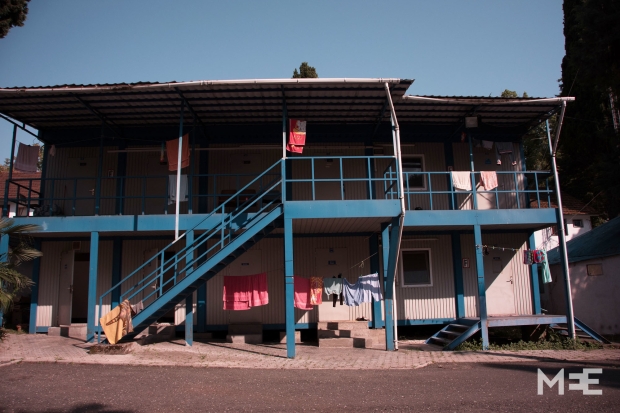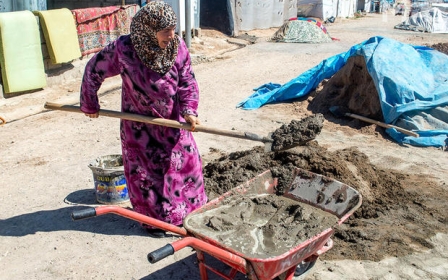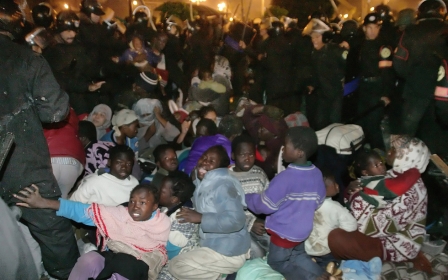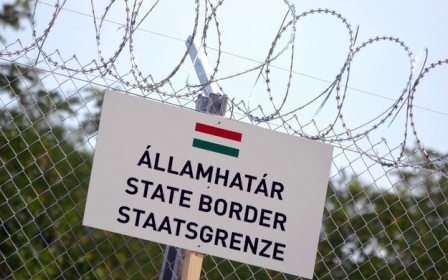From Syria to Abkhazia: A Syrian woman’s journey
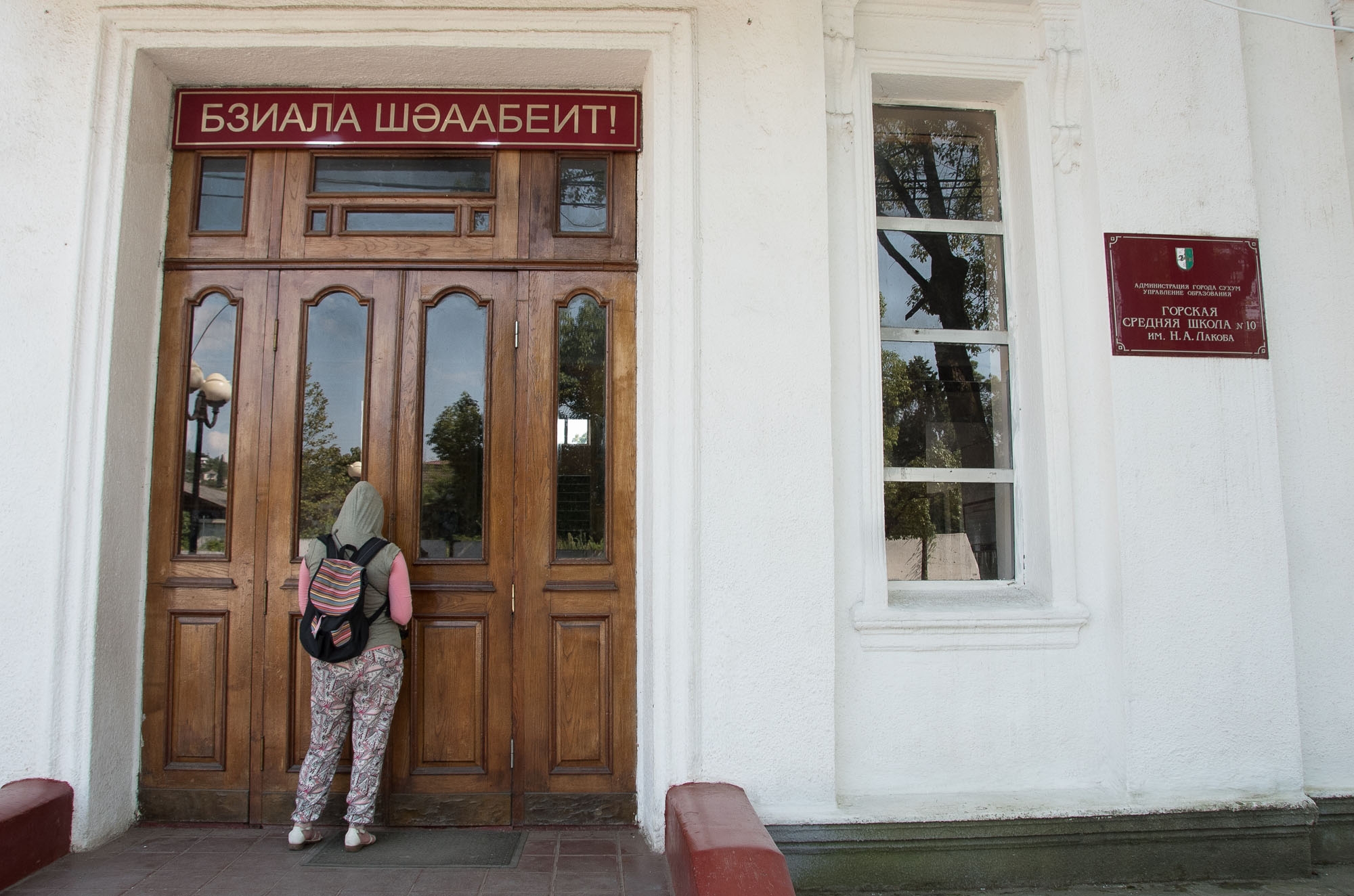
Seteni Zuliy, a 43-year-old mother of four, left Syria more than two years ago. Behind her, a regular, middle-class job and an estranged husband who worked for the government. Ahead, a country of which she had little knowledge except that her great-grandfather once lived there, before himself fleeing south to what was then the Ottoman Empire.
Rather than go to Greece or Italy and make her way up Europe as thousands of refugees have done, Zuliy’s destination was Abkhazia, a disputed territory on the Black Sea between Georgia and Russia, after becoming convinced she would not “legally” be able to take herself and her four children to Europe.
“I used to think I knew the pain my great-grandfather felt, but now that I know what it feels like to not be allowed to return to the place where you were born… I understand that I didn’t actually realise how he felt,” Zuliy said, referring to her forebear’s forced displacement from the Caucasus across the Black Sea into the Ottoman Empire at the end of the 19th century.
In 1864, a policy of Russian expansion into the Caucasus territories had led to the exile, forced migration, and massacre of over 1 million Circassians.
“It was a forced migration, Russia forced them into the Ottoman Empire,” Zuliy said. “My great-grandfather escaped [the killing] by hiding out with the family’s help.”
While Circassians have been living in the Middle East for over a 150 years, a present-day Circassian sub-national identity has been highlighted with the continuation of the conflict in Syria, as hundreds of Syrians of Circassian origins have decided to make their way “back” to the Caucasus.
As she speaks, Zuliy makes constant comparisons between what had happened in the Caucasus and the current Syrian crisis. “It is always about the dominant oppressing the less powerful - this is what happened with the ethnic cleansing of the Circassians, this is what happened with the Abkhazia-Georgia conflict, and it is what is happening now in Syria,” she said.
Abkhazia, recognised as a state only by Russia, Nicaragua and Venezuela, is itself a politically unstable area. More than 22 years after declaring its “independence” from Georgia in 1993, the territory still suffers the consequences of its mid-90s conflict with Georgia, especially as it has had to endure a European Union-backed international embargo for years.
The United Nations and Western countries have all supported Georgia, which maintains that it has only temporarily lost control of Abkhazia. In addition, almost 200,000 ethnic Georgians had to flee the territory. Russia maintains a dominant presence in the area and it is the Russian army that is present on Abkhazia’s borders.
Despite that unsettled national identity, many Syrian families have arrived in the territory through Abkhazian state-sponsored trips. Zuliy, however, made her way to Abkhazia on her own - from Syria, to Jordan, to Moscow, then south to Krasnodar before crossing into Abkhazia, all without knowing one word of Russian.
Her trip took three days, 11 hours of which she spent being interrogated by security in Moscow.
“They asked me why I was there, about my political affiliations in Syria... they were afraid I would apply for asylum in Russia,” Zuliy said. Carrying four children, one of whom was still being breastfed, throughout the trip put her “on the tip” of her nerves. There were nine other Syrians with her at the Moscow airport, but “they were sent back”.
“I was born in the Sham [Syria], but my soul was born in Abkhazia,” Zuliy told Middle East Eye. She added that her great-grandfather would say that Abkhazia was the “land of the soul”.
The problem for Zuliy and the hundreds of other Syrians who have made it to Abkhazia is, despite the sense of strong links, the lack of “recognition” they receive once there, and thus a lack of access to a good education system, and most importantly, a lack of work.
“A lot of people have already left” due to the lack of jobs and opportunities, she said, adding that, for the most part, “there is no future in Abkhazia”. In addition, services are poor, and water and electricity can be cut off for days at a time.
“Abkhazians who support Russia are not happy with the Syrian presence here... they think the Syrians are competing with them [for jobs],” explained Zuliy.
Even so, there is a group of Abkhazians who want the state to sponsor the “return” of Syrians to Abkhazia. Izida Chania, editor of the Abkhazian Nujnaya Gazeta, told Voice of America in 2013: “We are trying to increase the quantity of ethnic Abkhaz living in Abkhazia.”
An Abkhazian government official Viacheslav Chirikba told the news outlet: “Many of them have very useful professions - electricians - we have a need of them,” he said. “So many of them already start working, which is very good.”
The Abkhazian state has sponsored trips for two groups of Circassian-Syrians, Suzanne Artuaa, who is also a Syrian of Circassian origin and works at the Danish Refugee Council located in Sukhumi, told MEE.
As for why Syrians are heading to Abkhazia, “there are different reasons people have for coming here,” Artuaa said. “There are people that lost everything they had [because of the war], there are others that saw it as protection in case something would happen, and there are some that really consider this their nation.”
Upon arrival, most of the Syrians were made to stay in a former UN ceasefire observer mission residence, which Zuliy said had been very difficult due to the fact that it was far from the city centre.
Back in Damascus
When she lived in Damascus, Zuliy was a curator responsible for the Department of the Near East in the National Museum of Damascus. As a student, Zuliy studied history, received a diploma in archaeology and later studied for a Master’s Degree, also in archaeology. She spoke about the political nature of work in archaeology, making references to both Syrian and Abkhazian authorities who control the field in both countries.
All National Museum employees were expected to join gatherings in support of the government and President Bashar al-Assad. “I used to take my pregnancy as an excuse to not join the ‘we love you Bashar’ protests,” Zuliy said.
Despite working under the Ministry of Culture in Syria for over 15 years, her work now goes unrecognised in official circles in Syria. Zuliy said she does not know why, but she suspects it is because of her political views, although she could not be particularly outspoken due to the social circles she lived among.
As peaceful protests that began in Damascus in March 2011 developed into civil war, and the government reaction to its opponents escalated to air attacks in and around Damascus, Zuliy’s home was not targeted because behind them there was a military zone, but they could hear the airstrikes nearby.
“I would wonder… if it is so loud from here, how must it be for people whose homes were getting targeted?”
Unable to handle living amidst a building full of officers and people who had been either close to or supported the Syrian government, Zuliy soon left her husband because of his politics and proximity to the government. Her name is believed to be listed on the Syrian borders, and she is not allowed to return there - nor was she allowed to renew her Syrian passport after arriving in Abkhazia.
In Abkhazia, almost all the Syrians have been allowed to apply for national Abkhaz ID cards. Zuliy, however, was asked to present “proof” of her divorce before her children could apply for nationality that only a few other countries in the world recognise.
More than two years later, her older children speak Russian, have made Abkhaz friends, and even get embarrassed by their mother’s Arabic accent in Russian. Zuliy herself attends Abkhazian language lessons when she finds the time, and has befriended many of the women who work in Abkhazia’s national museum, with whom she shares archaeological interests.
“I want any woman to benefit from this experience,” Zuliy said, adding that there are many Syrians who stay in bad marriages whilst asking themselves, “where do I go… but remember, there is a great god and dignity is more important.”
As Zuliy rebuilds her own life from scratch, there is hope in the growing life of her family. Not least, one of her daughters was born on the same week that the anti-Assad protests began in 2011 at the Ummayad Mosque in Damascus.
“She is as old as the revolution,” Zuliy said.
New MEE newsletter: Jerusalem Dispatch
Sign up to get the latest insights and analysis on Israel-Palestine, alongside Turkey Unpacked and other MEE newsletters
Middle East Eye delivers independent and unrivalled coverage and analysis of the Middle East, North Africa and beyond. To learn more about republishing this content and the associated fees, please fill out this form. More about MEE can be found here.


